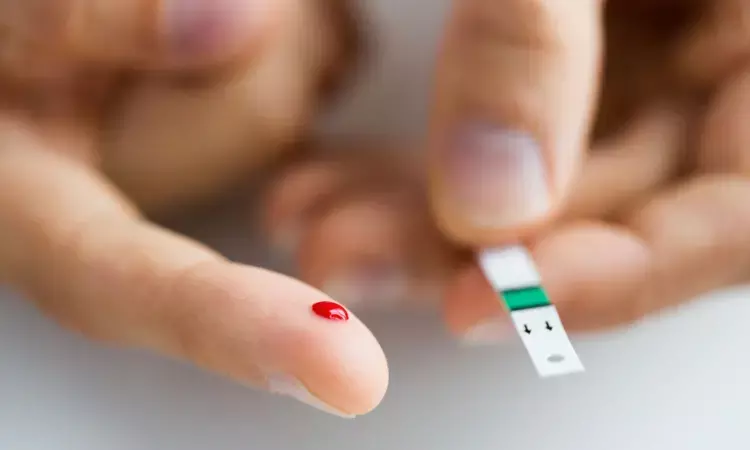- Home
- Medical news & Guidelines
- Anesthesiology
- Cardiology and CTVS
- Critical Care
- Dentistry
- Dermatology
- Diabetes and Endocrinology
- ENT
- Gastroenterology
- Medicine
- Nephrology
- Neurology
- Obstretics-Gynaecology
- Oncology
- Ophthalmology
- Orthopaedics
- Pediatrics-Neonatology
- Psychiatry
- Pulmonology
- Radiology
- Surgery
- Urology
- Laboratory Medicine
- Diet
- Nursing
- Paramedical
- Physiotherapy
- Health news
- Fact Check
- Bone Health Fact Check
- Brain Health Fact Check
- Cancer Related Fact Check
- Child Care Fact Check
- Dental and oral health fact check
- Diabetes and metabolic health fact check
- Diet and Nutrition Fact Check
- Eye and ENT Care Fact Check
- Fitness fact check
- Gut health fact check
- Heart health fact check
- Kidney health fact check
- Medical education fact check
- Men's health fact check
- Respiratory fact check
- Skin and hair care fact check
- Vaccine and Immunization fact check
- Women's health fact check
- AYUSH
- State News
- Andaman and Nicobar Islands
- Andhra Pradesh
- Arunachal Pradesh
- Assam
- Bihar
- Chandigarh
- Chattisgarh
- Dadra and Nagar Haveli
- Daman and Diu
- Delhi
- Goa
- Gujarat
- Haryana
- Himachal Pradesh
- Jammu & Kashmir
- Jharkhand
- Karnataka
- Kerala
- Ladakh
- Lakshadweep
- Madhya Pradesh
- Maharashtra
- Manipur
- Meghalaya
- Mizoram
- Nagaland
- Odisha
- Puducherry
- Punjab
- Rajasthan
- Sikkim
- Tamil Nadu
- Telangana
- Tripura
- Uttar Pradesh
- Uttrakhand
- West Bengal
- Medical Education
- Industry
Elevated Fasting Blood sugar Linked to Higher Readmissions in Elderly HF Patients

A recent retrospective study underlined the significant link between elevated fasting blood glucose (FBG) levels and the likelihood of readmission within one year among elderly patients with heart failure (HF). The findings were published in the Experimental and Clinical Endocrinology & Diabetes.
This study utilized electronic health records from PhysioNet and focused on HF patients aged 60 and older to bridge the existing gap in evidence concerning the association between FBG levels and adverse outcomes in this vulnerable population. The research incorporated baseline data, comorbidities and laboratory test results as covariates from a total of 374 elderly patients in its analysis. The relationship between 1-year readmission rates and varying glucose levels was meticulously examined through Kaplan-Meier plots provides valuable insights into the potential impact of FBG on the health outcomes of HF patients.
This study revealed the association between FBG levels and the rate of readmission in elderly patients with HF with a hazard ratio of 1.0264 (95% CI 0.9994 to 1.0541), following meticulous adjustments for relevant factors. The diabetes group expressed a higher risk of readmission when compared to the normal group, despite this difference did not reach statistical significance. The hazard ratios and their corresponding 95% confidence intervals were 1.2134 (0.98111.5007), 1.2393 (0.99931.5371), and 1.1905 (0.9570~1.4809), respectively.
The robustness of the model highlighted risk models with subgroup analysis by demonstrating FBG levels that consistently exerted a stable effect on outcome events. This effect remained unaffected by covariates such as age, gender, body mass index, glomerular filtration rate and brain natriuretic peptide. These findings offer crucial insights into the connection between elevated FBG at the time of initial hospitalization and the subsequent likelihood of readmission within one year among elderly patients with HF.
Source:
Wang, D., & Wu, S. (2024). Relationship between fasting blood glucose and readmission within 1 year in elderly patients with heart failure. Experimental and Clinical Endocrinology & Diabetes. https://doi.org/10.1055/a-2233-3917
Neuroscience Masters graduate
Jacinthlyn Sylvia, a Neuroscience Master's graduate from Chennai has worked extensively in deciphering the neurobiology of cognition and motor control in aging. She also has spread-out exposure to Neurosurgery from her Bachelor’s. She is currently involved in active Neuro-Oncology research. She is an upcoming neuroscientist with a fiery passion for writing. Her news cover at Medical Dialogues feature recent discoveries and updates from the healthcare and biomedical research fields. She can be reached at editorial@medicaldialogues.in
Dr Kamal Kant Kohli-MBBS, DTCD- a chest specialist with more than 30 years of practice and a flair for writing clinical articles, Dr Kamal Kant Kohli joined Medical Dialogues as a Chief Editor of Medical News. Besides writing articles, as an editor, he proofreads and verifies all the medical content published on Medical Dialogues including those coming from journals, studies,medical conferences,guidelines etc. Email: drkohli@medicaldialogues.in. Contact no. 011-43720751


